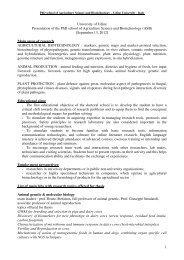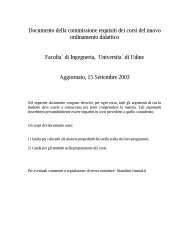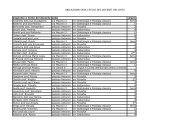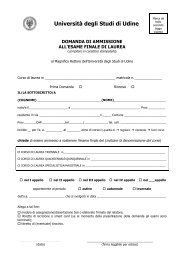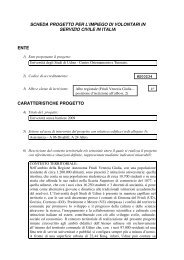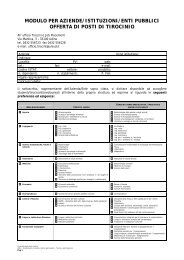â¢GUIDA ECONOMIA 07-08 - Università degli studi di Udine
â¢GUIDA ECONOMIA 07-08 - Università degli studi di Udine
â¢GUIDA ECONOMIA 07-08 - Università degli studi di Udine
You also want an ePaper? Increase the reach of your titles
YUMPU automatically turns print PDFs into web optimized ePapers that Google loves.
prospectus u<strong>di</strong>ne<br />
229<br />
2. Classification of the organizational theories;<br />
3. The organizational actors: competences,<br />
forms of rationality, motivation;<br />
4. The relationship between organization<br />
and environment: technology, markets<br />
and institutions and their influence on<br />
organizations, focus on contingency theories;<br />
5. Relations among the organisational<br />
actors. Basic coor<strong>di</strong>nation forms, the<br />
transaction costs theory and its developments;<br />
6. The simple organizational form: features,<br />
strengths and weaknesses;<br />
7. Tasks and tools for organizational<br />
design;<br />
8. The functional form: features,<br />
strengths and weaknesses;<br />
9. The <strong>di</strong>visional form: features, strengths<br />
and weaknesses;<br />
10. The adhocratic and matrix form: features,<br />
strengths and weaknesses. The<br />
inter-organizational forms of coor<strong>di</strong>nation.<br />
Bibliography<br />
The textbook is<br />
- G. COSTA, P. GUBITTA, Organizzazione<br />
aziendale: mercati, gerarchie e convenzioni,<br />
McGraw-Hill, Milano, 2004.<br />
Further rea<strong>di</strong>ng<br />
- J.D. THOMPSON, Organizations in Action,<br />
McGraw-Hill, New York, 1967.<br />
- A. GRANDORI, Organization and Economic<br />
Behaviour, Routledge, London, 2000.<br />
ORGANIZATIONAL BEHAVIOUR<br />
AND CHANGE<br />
Prof. Daniel Pittino<br />
Prof.ssa Cristiana Compagno<br />
Aims<br />
The course provides a platform for students<br />
to develop a comprehensive understan<strong>di</strong>ng<br />
of organizational behaviour<br />
with respect to processes, tasks and transformation<br />
of organizations.<br />
Contents<br />
The course is <strong>di</strong>vided into two modules<br />
and the course program is structured as<br />
follows:<br />
Module 1: Organizational Behaviour<br />
The course provides a platform for students<br />
to develop a comprehensive understan<strong>di</strong>ng<br />
of organizational behavior with<br />
respect to in<strong>di</strong>vidual groups and interpersonal<br />
processes. The program includes<br />
theoretical lessons and an introduction to<br />
management techniques and problem<br />
solving through case <strong>stu<strong>di</strong></strong>es and simulations.<br />
The program is structured as follows:<br />
Organizational Behaviour<br />
1. The field of organizational behaviour:<br />
definition and framework, fundamental<br />
concepts.<br />
2. In<strong>di</strong>vidual processes and characteristics:<br />
personality, attitude, learning, motivation;<br />
perception and decision; the<br />
process of organizational sensemaking.<br />
3. Interpersonal and group processes and<br />
characteristics: group dynamics - types of<br />
groups, reasons for group formation,<br />
stages of group development (forming,<br />
storming, norming, performing); main<br />
characteristics of groups; group behavior<br />
and conflict - levels of conflict; consequences<br />
of functional and dysfunctional<br />
conflict, conflict management.<br />
4. Power, politics, power and influence;<br />
interpersonal sources of power; structural<br />
and situational sources of power; political<br />
behavior in organizations.<br />
5. Negotiation processes, characteristics<br />
of negotiations, negotiations and game<br />
theory.<br />
6. Leadership: nature of the leadership<br />
process; models of leadership - leadership<br />
traits theory, behavioral theories of<br />
leadership, leader-follower models; evaluation<br />
of models of leadership.







